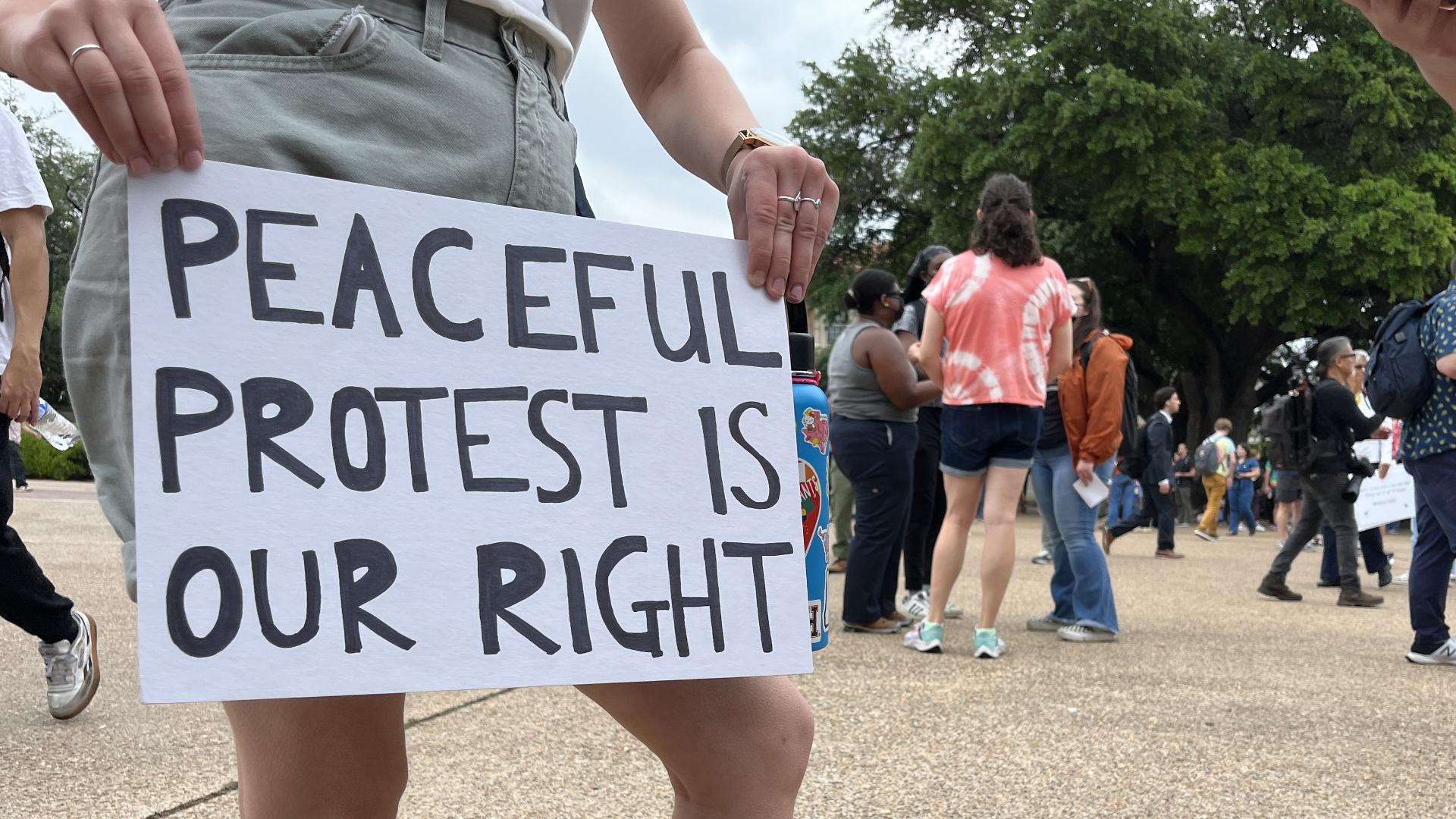AUSTIN, Texas — On Wednesday, a pro-Palestine protest at the University of Texas at Austin turned into chaos, as dozens of students were arrested and left wondering why their right to free speech was taken away.
The Palestine Solidarity Committee organized the walk out to demand the university to divest from Israel. But as soon as Texas Department of Public Safety (DPS) troopers showed up, the mood shifted.
“I turned around to make sure the people behind me were OK and I wasn’t stepping on them,” protestor Kayden Casper said. “That’s when they grabbed me by the back of the hair, a fist full of my hair to the scalp, and dragged me to the ground.”
What are students' rights to protest?
According to the U.S. Constitution, citizens have the right to gather and protest in a public space, such as a public university like UT.
Earlier in the week, UT denied the Palestine Solidarity Committee’s request for the protest, saying it would violate the university’s policies and disrupt campus operations. The ACLU of Texas says universities can have content neutral policies and reasonable restrictions on public gatherings, but the Constitution remains the supreme law of the land.
“Generally, protestors are not required to get permission from the government to congregate or protest or march in a traditional public forum,” Brian Klosterboer, an attorney for ACLU of Texas, said.
Public universities have been designated as public forums, therefore creating a safe space for people to protest. Texas lawmakers also reinforced this constitutional right with a bill Gov. Greg Abbott signed into law back in 2019. Senate Bill 18 allows students to gather and protest at higher education institutions.
When can law enforcement stop a protest?
Klosterboer said law enforcement officials are allowed to put reasonable time, place and manner restrictions on protests to maintain the flow of traffic or to stop violence from occurring. The one caveat is they can’t change the rules depending on the subject of the protest.
“You can’t say one day to protestors, ‘You all have to go home,’ even though in the past you’ve allowed other protestors to use that same lawn or that same university quad area to express their message,” Klosterboer said.
That's why the ACLU of Texas says the actions of DPS troopers on Wednesday are deeply concerning.
“It’s a very dangerous, slippery slope once the government starts arresting and retaliating against people for congregating and for engaging in a core, constitutionally protected right of freedom of speech,” Klosterboer said.
Klosterboer said this move to send DPS troopers into the protest was a political one by Abbott to advance his agenda. In the governor's tweet on Wednesday, he wrote, "These protesters belong in jail. Antisemitism will not be tolerated in Texas. Period. Students joining in hate-filled, anti-Semitic protests at any public college or university in Texas should be expelled.”
UT Austin's response to the protest
UT released a statement Thursday afternoon about the protest, saying that about half of the people who were arrested had no affiliation with the university.
“Wednesday’s protest organized by the Palestine Solidarity Committee sought to follow the playbook of the national campaign to paralyze the operations of universities across the country," UT said. "Like at each of those universities, and confirming our serious concern, there was significant participation by outside groups present on our campus yesterday.”
The university went on to say that since October, there have been 13 pro-Palestinian free speech events on campus that occurred without any incidents. KVUE tried to ask UT which specific rules the students were violating before DPS troopers were called in, but the university has not responded directly to that question.
UT also sent out an email to students Thursday afternoon listing out what students can and can’t do on campus when it comes to protesting. Students are able to assemble peacefully to protest, hand out flyers and brochures, invite guest speakers to present in common outdoor areas and engage with staff members if they need assistance or have questions.
On the list of things that UT said disrupt the operations of the university, there were a few things protesters did on Wednesday. The university said any person who violates these rules of policies are subject to immediate removal for campus or arrest. Below are just a few items on that list:
- Making loud sounds that interfere with learning; teaching, or other official actions; blocking entrances, exits, and walkways; calls for immediate lawless behavior, and vandalism
- Camp or attempt to camp on university property
- Refuse to comply with directions given by university officials or law enforcement
- Use amplified sound without prior approval
- Wear masks or disguises
UT President Jay Hartzell on Wednesday said the university will continue to take necessary steps so that the university functions continue without any interruptions.

